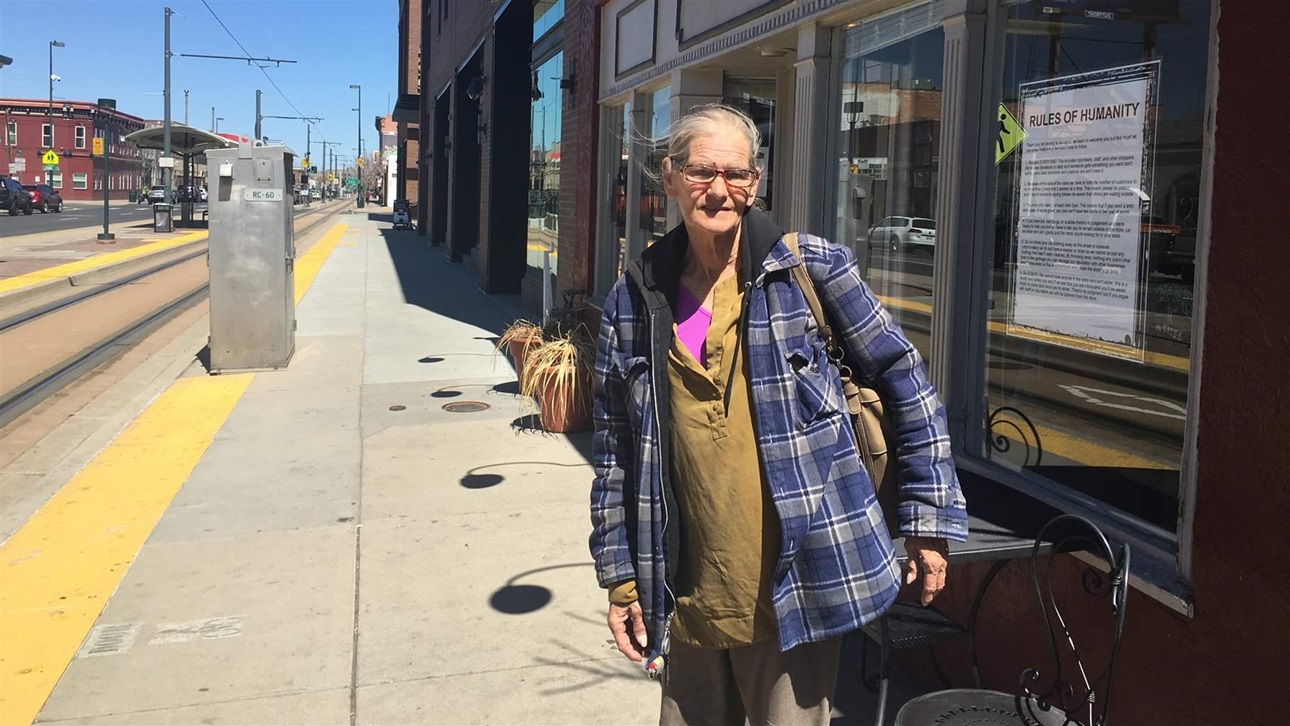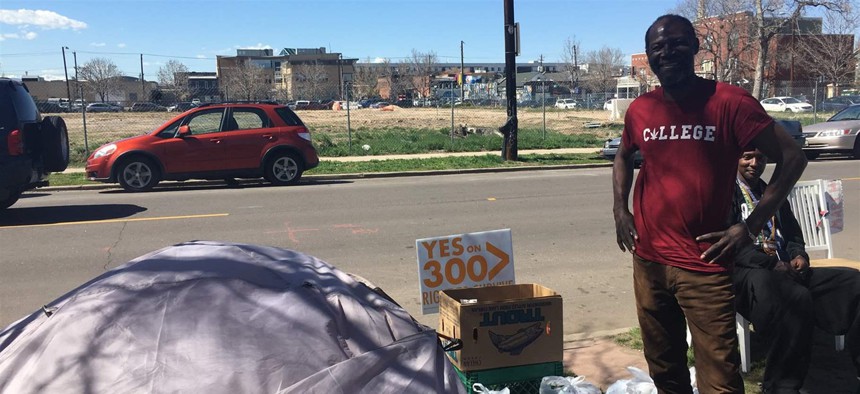Connecting state and local government leaders
The Denver initiative is the latest front in a campaign advocates for homeless people have been waging at the state level for years.
This story was originally published by Stateline, an initiative of The Pew Charitable Trusts.
DENVER — Jerry Burton has lived in a rapidly gentrifying neighborhood here for the past few months, in an orange tent pitched on a sidewalk. He and the other homeless campers on the block — Burton proudly calls the encampment “Jerr-E-Ville,” and has declared himself the unofficial mayor — are defying the city’s urban camping ban, which means they are always bracing for a visit from the police.
A caseworker from the U.S. Department of Veterans Affairs is trying to find permanent housing for the 57-year-old Marine Corps veteran whose tent is surrounded by his belongings neatly arranged in small plastic bags. In the meantime, Burton is hoping that Denver voters next week will overturn the city’s camping ban, thanks to an initiative he and others petitioned to get on the ballot.
The ballot question, dubbed the “Right to Survive,” would declare that everyone has the right to rest, eat and shelter in public places without being harassed. Supporters say it would shield people experiencing homelessness from unfair citations and arrests.
But business, environmental and social service organizations fear it would proliferate dangerous encampments in parks and on sidewalks without helping to house people.
“I find Initiative 300 to be one of the most frightening and heinous initiatives that I’ve witnessed in my career,” said Jeff Shoemaker, a former Republican state representative and executive director of the Greenway Foundation, a nonprofit that works to revitalize the South Platte River and its tributaries.
The Denver initiative is the latest front in a campaign advocates for homeless people have been waging at the state level for years. Lawmakers in California, Oregon and Colorado have repeatedly introduced bills that, by articulating a “right to rest,” would override local ordinances that penalize people for living in public spaces. Lawmakers in Washington state proposed similar legislation this year. None of the bills passed.
So Denver Homeless Out Loud, an advocacy group that backed the Colorado legislation, decided to take the issue to voters. If the first-of-its-kind “Right to Survive” ballot initiative is successful — a late January/early February poll taken by the opposition campaign suggested it could be approved — its supporters are likely to try to pass similar initiatives elsewhere in Colorado and across the West.
“If it passes, we hopefully may not have to run another statewide initiative,” said Democratic Rep. Jovan Melton, sponsor of the Colorado Right to Rest bill. “We may be able to go just city by city to deal with this.”
When Living on the Streets Is a Crime
About 552,000 people in the United States are living on the street, in emergency shelters or in transitional housing, according to the latest count from the U.S. Department of Housing and Urban Development. Most people experiencing homelessness are clustered in expensive cities such as New York, Los Angeles and Seattle.
Cities nationwide have laws on the books intended to keep destitute people moving and out of sight. One-third of 187 cities surveyed by the National Law Center on Homelessness and Poverty, a Washington, D.C., nonprofit, prohibit camping in public. About a quarter of cities surveyed prohibit sleeping in certain public places, and almost half prohibit sitting or lying down in public.
Even if a person is just sitting outside or sleeping in a clean tent, they can be told to either move on or be issued a fine, said Tristia Bauman, a senior attorney at the law center. “Even those activities are treated as public health and safety threats, when they are not.”
The Denver City Council in 2012 passed an urban camping ordinance that prohibits people from pitching tarps and tents or even covering themselves with a blanket in public places. Other city ordinances ban aggressive panhandling, public urination, and sitting or lying down in a public right of way, among other activities.
Other Colorado cities have passed similar laws, said Nantiya Ruan, a law professor at the University of Denver Sturm College of Law. “In our largest cities, we disproportionately cite and jail those who are homeless for these types of ordinances, and it costs the city a lot of money to do so,” she said.
But enforcement is spotty. Denver police officers typically tell people violating the camping ban to move rather than throwing them in jail. Under the ordinance, police officers are required to give offenders a warning and try to connect them to assistance, such as addiction treatment, before making an arrest.
The camping ban still has an effect, said Terese Howard, an organizer for Denver Homeless Out Loud.
“The impact is a lot of sleep deprivation, it’s a lot of stress and mental health struggle, for constantly not knowing where you can go; it’s physical health problems,” she said. “It’s safety risks, people being raped and assaulted after being forced to move into unsafe areas.”
Many people have no choice but to sleep outside, Howard said, because the city of Denver doesn’t have enough shelter beds for the estimated 3,445 people who need them.
Even when beds are available, they’re not open to everyone. People can’t enter shelters when they’re drunk, high or have alcohol or drugs with them. And some people don’t want to stay in a noisy, crowded shelter, separated from their partner and their pets.
Sitting in the sunshine outside Impact Humanity, a Denver store that gives away clothes, a young man with sandy hair who declined to share his name said he’s been homeless for two years and prefers to sleep outside in good weather.
On winter nights, he said, homeless people may have to trespass to curl up in a sheltered place, such as an abandoned stairwell. “I notice a lot of people who freeze to death — you can’t just throw up a tent and all the gear it takes to stay warm,” he said.

Sleeping outside isn’t ideal for anybody, she said. And it could be safer. “There needs to be a designated ground area,” she said, protected from dangers such as cars skidding off the curb.
Who Gets to Use Public Space?
The National Law Center on Homelessness and Poverty and other legal aid groups have successfully sued various cities to change policies that disproportionately affect people experiencing homelessness.
For instance, Denver recently pledged to give homeless people more notice prior to cleaning up camps and to offer more storage lockers, toilets and trash cans as part of a settlement in a class-action lawsuit brought on behalf of the city’s homeless population.
But when advocates take their civil rights arguments to state lawmakers, they face serious opposition. The Western Regional Advocacy Project (WRAP), a San Francisco-based organization, has tried and failed for almost a decade to get “right to rest” legislation passed.
City leaders, law enforcement and business groups have pushed back every time, said Paul Boden, WRAP’s executive director. In Colorado, Rep. Melton said, his Right to Rest bill was opposed by city leaders who didn’t want the state to interfere with their ordinances.
The political fight in Denver, if anything, has been fiercer than the state battles that preceded it. The campaign against Initiative 300 has raised over $1.5 million, about 19 times the amount raised by the campaign backing the initiative.
The opposing campaign, funded primarily by business groups such as the National Association of Realtors and the Downtown Denver Partnership, says the initiative would stop the city from enforcing laws that protect public safety without helping people access housing.
“We do not believe this policy helps support those experiencing homelessness — or the broader community,” said Tami Door, president and CEO of the Downtown Denver Partnership, in an emailed statement. “We know that we can do better and believe we must work to expand upon services that support the dignity of people who are experiencing homelessness in our community.”
The measure would supersede a host of local ordinances, including park curfews, according to city officials’ interpretation of the broadly worded measure. The city says it could make police officers, park rangers and outreach workers reluctant to help people living on the street, as doing so could be considered harassment.
The ordinance also could make it more difficult for city staff to address health threats such as hepatitis A, rodents, feces, urine and discarded needles, the city said.
Denver Mayor Michael Hancock has said he doesn’t support either the Right to Survive initiative, or the state Right to Rest bill.
Trash discarded by homeless people is already a problem along the South Platte River, said Shoemaker of the Greenway Foundation. Before taking kids on outdoor excursions, he said, members of his education team scour the area for drug paraphernalia and human waste. An explosion of encampments in the city would further threaten the river’s health, he said.
Denver’s Right to Survive initiative has even been criticized by groups that supported the Colorado Right to Rest bill.
“I wouldn’t necessarily say that we’re opposed to the measure, because we understand the need for this conversation,” said Cathy Alderman, vice president of communications and public policy for the Colorado Coalition for the Homeless, a housing, health care and supportive services provider.
But her organization worries that the initiative’s language is vague, and that it doesn’t allocate resources to address homelessness. “If it does pass — there’s still no additional resources put into the system to make sure we don’t have the need for something like Right to Survive,” she said.
Ruan, the law professor, said courts would decide how to interpret the statute and noted that after six months the city council could step in to modify it. “It can be corrected by the city council, but it will force them to do something about this issue,” Ruan said of the councilmembers.
Howard, of Denver Homeless Out Loud, said concerns about human waste and trash are distinct from the camping ban. “Absolutely, there’s a desperate need for porta-potties, for trash services, and so on,” she said. “But that’s true regardless of whether we have the right to sleep or not.”
People who live on the streets don’t want the city to be overwhelmed with trash, either. “I don’t know how comfortable I feel about the parks turning into wastelands and dumps and stuff,” said the sandy-haired young man outside Impact Humanity. Maybe the city could do more to clean things up, he suggested.
They also want permanent solutions. “Hopefully, they will build housing that people can afford,” Burton said.
Regardless of the May 7 election result, the people behind the initiative and the state bills like it say they’ll keep fighting. “We understand that we’re going to hear ‘no.’ And we’re really good at getting our asses kicked,” WRAP’s Boden said. “But we’re going to keep coming back.”
Sophie Quinton is a staff writer for Stateline.

NEXT STORY: The Startups Born of Flint’s Water Crisis



